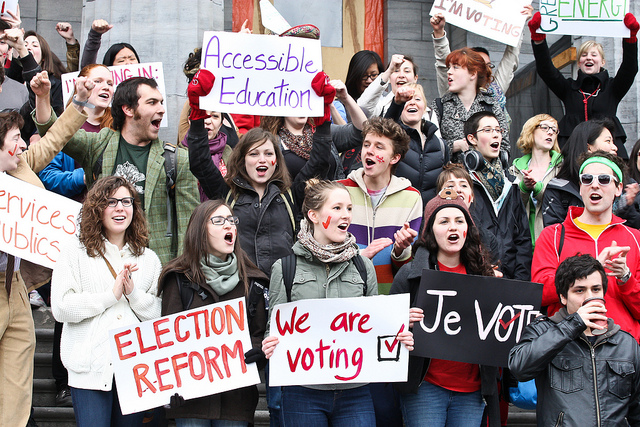Rapper Daniel Bennett, aka Transit, is a staple of the Calgary music scene, but he’s not exactly an ambassador for political change. His sole claim to political fame was a brief 2011 election PSA he did to ‘make rent.’ But Transit, like an increasing number of young Canadians, recognizes that a growing societal disconnect is diverting our generation from traditional engagement en masse. It’s reflected in his impassioned track ‘Anomie.’ “I wanted it to be an uncomfortable song,” Transit says, “just to…convey the frustration of it.”
The concern for the future of youth voting is widespread, usually discussed as a fatal rash of apathy caused by a careless generation. But what if youth disengagement is actually a result of frustration and perceived inequality? In a hypocritical twist, youth are accused of ignorance and laziness while being repeatedly ignored, sometimes to the point where the very suggestion of ‘civic duty’ is an insult to our agency. Anomie — not apathy — is reflected in statistics and the undercurrents of recent social movements.
According to a 2011 Elections Canada National Youth Survey, only three per cent of young Canadians consider voting a civic duty, versus almost a quarter of adults. Meanwhile, less than 12 per cent of youth who didn’t vote cited a lack of interest as a justification. For comparison, 19 per cent of youth decided not to vote due to distrust of parties and candidates, beliefs that no party represented their interests or beliefs that their vote wouldn’t have an impact.
The resilience of youth, reflected through the passion infused into movements like the ‘Maple Spring’ in Quebec and solidarity protests, Occupy, Idle No More and hundreds of environmental rallies across the country, should be celebrated. Regardless, the fact that youth have withdrawn our collective voice from the traditional constructs of democracy is highly problematic.
To our collective debt, issues like ageism and disempowerment don’t get discussed when the issue of abysmal youth turnout is breached. This selective acknowledgement is reminiscent of the way that modern inequalities are ignored in the relentless critique of 30-year olds forced to live with their parents. New levels of frustration, perhaps mislead by the ‘revolutionary’ sentiments of celebrities like Russell Brand and rapper Lupe Fiasco, are causing youth to boycott democracy.
Transit, who studied psychology and sociology in university, describes youth disengagement as a ‘learned-helplessness.’ “It’s a defense mechanism, I think for youth nowadays,” he says. “If they feel disconnected from society…they feel a sense of anomie.” At its worst, that anomie can result in a complete disregard for civic issues “because it’s a lot easier not to care than to feel something.”
Brigette Depape votes, but she may also represent that heightened frustration among Canadian youth. Not satisfied to forego her Parliamentary Paige position in an explosive act of protest during Harper’s throne speech, she has gone on to become a champion for a range of activist movements on the fringes of ‘traditional’ civic engagement.
Depape thinks the very concept of youth apathy is a ‘myth.’ Addressing the Canadian Auto Workers Union in May, 2012, she described her generation as “burning for change, hungry for change.” She elaborates that “young people want to get engaged, but often times they don’t know how.” She remembers all the peers who prompted her to take action — and the adult role models in her life who discouraged and even denounced her. “I do not believe in the government to change things, I don’t believe in the system to change things, I don’t believe in corporations to change things,” Depape says. “But I believe in us, when we come together.”
The Fair Elections Act is predicted to add even more friction to youth participation in direct democracy. Vouching at the polls will be cut, as will Elections Canada’s ability to educate minorities about the democratic process. This pedagogical capacity has included past programs like Student Vote, which increased the interest, knowledge and voting aspirations of high school students through virtual elections. Factor in the cultural devaluing (and subsequent axing) of CBC programs like ‘Reach for the Top’ (which marked Harper’s first TV appearance) and ‘Canada’s Next Great Prime Minister,’ plus federal programs like Katimavik, and it’s not hard to see how diminishing avenues for youth to explore civil society, community and political history may also contribute to a lack of genuine engagement.
Perhaps Harper’s personal philosophy is best reflected in his partisan background. Until 2011, the Conservatives were the only major party without a youth wing (there is now a semi-autonomous ‘Campus Conservatives’ collective): a legacy from Harper’s Alliance party.
As Harper closes doors to protestors like the Nishiyuu teens who trekked over 1500km in frigid temperatures to confront him, as he defunds engagement programs and increases friction for voting, he goes beyond isolating the nation’s youth. The government is perpetuating a new era of anomie, and daring youth to revolt. A true youth rebellion against governments like our own has been all but deliberately provoked.
Thinking about politicians’ lack of ambition in reflecting the true diversity of their constituents, I can’t help but feel that the real apathy is their own.
Photo: flickr/Adam Scotti



